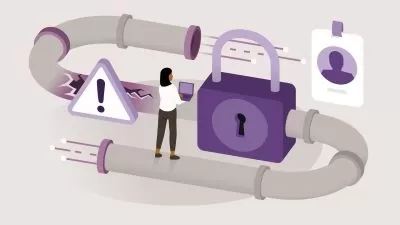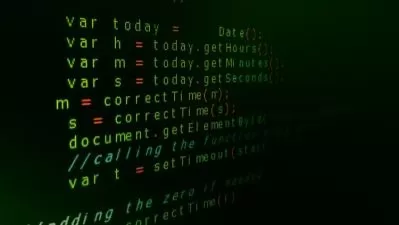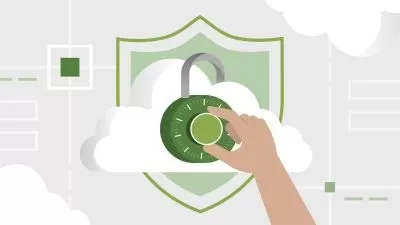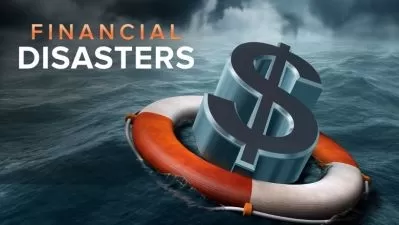Crisis Ready: Mastering Tabletop Exercises
Eslam Eldakrory
3:06:26
Description
Strategies, Skills, and up-to-date procedures for Effective design and execution of Crisis Simulation exercises
What You'll Learn?
- What is a Tabletop Exercises?
- What are the Benefits of Tabletop Exercises?
- What are the most common types of exercises?
- What Are The Key Principles To Deliver An Effective Crisis Simulation?
- How do I plan for an effective tabletop exercise?
- How to identify Objectives and Goals of the Exercise?
- The 6 Key Steps For A Well-Planned Tabletop Exercise
- How to identify Organizational Risks and Vulnerabilities?
- How to Create Realistic Crisis Scenarios?
- How to create a Comprehensive Exercise Plan and Timeline?
- Who would ideally set on my key participants’ list?
- The ultimate 16 key steps you can follow to facilitate and execute an effective and engaging tabletop exercise.
- What are the After-Action Review (AAR) reports are for?
- How do I effectively and efficiently facilitate these sessions?
- The ultimate action plan for leading and facilitating effective Post-Exercise Debrief and After Action Review (AAR) Sessions
- Why Integration and Sustainability is important for organizational resilience?
- What are the 10 Key Steps to integrate Tabletop Exercises into Organizational Training Programs?
- What are the 10 Key Steps to build a Culture of Preparedness within the Organization
- Real-Life Tabletop Crisis Exercises from Various Industries
- Lessons and Best Practices from Successful Simulations
Who is this for?
What You Need to Know?
More details
DescriptionModule 1: Introduction to Tabletop Crisis Exercises
Understanding the Purpose and Benefits of Tabletop Exercises: Participants will learn about the importance of tabletop exercises in testing and enhancing organizational crisis response capabilities. Discussions will focus on how these exercises help identify gaps in procedures, improve communication, and increase overall preparedness.
Differentiating Between Tabletop, Functional, and Full-Scale Exercises: This section will clarify the distinctions between various types of crisis exercises, emphasizing the specific advantages of tabletop exercises, such as cost-effectiveness and flexibility.
Key Principles of Effective Crisis Simulation: Participants will delve into the fundamental principles that underpin successful crisis simulations, including realism, participant engagement, and the balance between challenge and achievability.
Module 2: Preparation and Planning
Identifying Objectives and Goals of the Exercise: This module will guide participants in setting clear, achievable goals for their tabletop exercises. Emphasis will be placed on aligning exercise objectives with organizational priorities and desired outcomes.
Selecting the Appropriate Scenario for the Organization: Participants will explore how to choose scenarios that are relevant to their industry and specific risks, ensuring that exercises are realistic and impactful.
Developing Realistic and Relevant Crisis Scenarios: Practical techniques for creating scenarios that mirror real-world challenges will be discussed. Participants will learn how to incorporate various elements such as time constraints, resource limitations, and external pressures.
Creating a Comprehensive Exercise Plan and Timeline: This section will cover the step-by-step process of creating an exercise plan, including defining roles, scheduling key events, and allocating resources effectively.
Building a Skilled Exercise Planning Team: Participants will understand the importance of assembling a diverse and knowledgeable planning team. Strategies for recruiting, training, and managing team members will be explored.
Module 3: Facilitation and Execution
Techniques for Effective Facilitation and Moderation: Participants will learn facilitation techniques to maintain a constructive and focused environment during the exercise. This includes active listening, conflict resolution, and time management skills.
Module 4: After-Action Review (AAR) and Improvement Planning
Conducting Post-Exercise Debriefings and AAR Sessions: Participants will learn the importance of AAR sessions in extracting valuable lessons from the exercise. Techniques for conducting constructive and insightful debriefings will be explored.
Analyzing Participant Performance and Identifying Strengths and Weaknesses: Participants will gain skills in objectively evaluating participant performance, identifying areas of strength, and pinpointing areas that require improvement. This analysis forms the basis for the improvement planning process.
Incorporating Feedback for Future Exercise Design: Participants will understand the value of feedback loops in exercise improvement. Strategies for collecting and integrating feedback from participants, observers, and stakeholders into future exercise designs will be covered.
Module 5: Integration and Sustainability
Integrating Tabletop Exercises into Organizational Training Programs: This module will explore methods for seamlessly integrating tabletop exercises into broader organizational training initiatives. Participants will learn how to create a cohesive training curriculum that incorporates tabletop exercises.
Establishing a Continuous Exercise Improvement Cycle: Participants will understand the concept of a continuous improvement cycle for crisis exercises. This includes regular review, updating scenarios, and adapting exercises to address emerging threats and challenges.
Building a Culture of Preparedness within the Organization: Strategies for fostering a culture of preparedness among employees will be discussed. Participants will explore techniques for promoting proactive behavior, awareness, and responsibility at all levels of the organization.
Module 6: Extra Materials for Your Success
Analyzing Real-Life Tabletop Crisis Exercises from Various Industries: Participants will examine real-life case studies of tabletop exercises conducted in different industries, including healthcare, finance, manufacturing, and government. Analyzing these cases will provide insights into industry-specific challenges and solutions.
Extracting Lessons and Best Practices from Successful Simulations: Participants will identify common themes and best practices from successful tabletop exercises. They will explore innovative approaches, creative scenario designs, and effective facilitation techniques used in these exercises.
Who this course is for:
- Crisis Management Professionals
- Emergency Management Professionals
- Risk Management Professionals
- Business Continuity Management Professionals
- Enterprise Security Management Professionals
- Cyber security professional
Module 1: Introduction to Tabletop Crisis Exercises
Understanding the Purpose and Benefits of Tabletop Exercises: Participants will learn about the importance of tabletop exercises in testing and enhancing organizational crisis response capabilities. Discussions will focus on how these exercises help identify gaps in procedures, improve communication, and increase overall preparedness.
Differentiating Between Tabletop, Functional, and Full-Scale Exercises: This section will clarify the distinctions between various types of crisis exercises, emphasizing the specific advantages of tabletop exercises, such as cost-effectiveness and flexibility.
Key Principles of Effective Crisis Simulation: Participants will delve into the fundamental principles that underpin successful crisis simulations, including realism, participant engagement, and the balance between challenge and achievability.
Module 2: Preparation and Planning
Identifying Objectives and Goals of the Exercise: This module will guide participants in setting clear, achievable goals for their tabletop exercises. Emphasis will be placed on aligning exercise objectives with organizational priorities and desired outcomes.
Selecting the Appropriate Scenario for the Organization: Participants will explore how to choose scenarios that are relevant to their industry and specific risks, ensuring that exercises are realistic and impactful.
Developing Realistic and Relevant Crisis Scenarios: Practical techniques for creating scenarios that mirror real-world challenges will be discussed. Participants will learn how to incorporate various elements such as time constraints, resource limitations, and external pressures.
Creating a Comprehensive Exercise Plan and Timeline: This section will cover the step-by-step process of creating an exercise plan, including defining roles, scheduling key events, and allocating resources effectively.
Building a Skilled Exercise Planning Team: Participants will understand the importance of assembling a diverse and knowledgeable planning team. Strategies for recruiting, training, and managing team members will be explored.
Module 3: Facilitation and Execution
Techniques for Effective Facilitation and Moderation: Participants will learn facilitation techniques to maintain a constructive and focused environment during the exercise. This includes active listening, conflict resolution, and time management skills.
Module 4: After-Action Review (AAR) and Improvement Planning
Conducting Post-Exercise Debriefings and AAR Sessions: Participants will learn the importance of AAR sessions in extracting valuable lessons from the exercise. Techniques for conducting constructive and insightful debriefings will be explored.
Analyzing Participant Performance and Identifying Strengths and Weaknesses: Participants will gain skills in objectively evaluating participant performance, identifying areas of strength, and pinpointing areas that require improvement. This analysis forms the basis for the improvement planning process.
Incorporating Feedback for Future Exercise Design: Participants will understand the value of feedback loops in exercise improvement. Strategies for collecting and integrating feedback from participants, observers, and stakeholders into future exercise designs will be covered.
Module 5: Integration and Sustainability
Integrating Tabletop Exercises into Organizational Training Programs: This module will explore methods for seamlessly integrating tabletop exercises into broader organizational training initiatives. Participants will learn how to create a cohesive training curriculum that incorporates tabletop exercises.
Establishing a Continuous Exercise Improvement Cycle: Participants will understand the concept of a continuous improvement cycle for crisis exercises. This includes regular review, updating scenarios, and adapting exercises to address emerging threats and challenges.
Building a Culture of Preparedness within the Organization: Strategies for fostering a culture of preparedness among employees will be discussed. Participants will explore techniques for promoting proactive behavior, awareness, and responsibility at all levels of the organization.
Module 6: Extra Materials for Your Success
Analyzing Real-Life Tabletop Crisis Exercises from Various Industries: Participants will examine real-life case studies of tabletop exercises conducted in different industries, including healthcare, finance, manufacturing, and government. Analyzing these cases will provide insights into industry-specific challenges and solutions.
Extracting Lessons and Best Practices from Successful Simulations: Participants will identify common themes and best practices from successful tabletop exercises. They will explore innovative approaches, creative scenario designs, and effective facilitation techniques used in these exercises.
Who this course is for:
- Crisis Management Professionals
- Emergency Management Professionals
- Risk Management Professionals
- Business Continuity Management Professionals
- Enterprise Security Management Professionals
- Cyber security professional
User Reviews
Rating
Eslam Eldakrory
Instructor's Courses
Udemy
View courses Udemy- language english
- Training sessions 20
- duration 3:06:26
- Release Date 2024/01/03





















